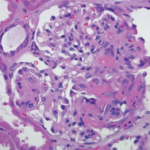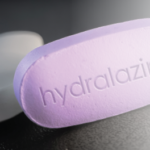Once the diagnosis has been confirmed and disease activity analyzed, treatment is initiated. The use of cyclophosphamide and rituximab, in addition to glucocorticoids, changed the fate of these diseases from fatal to chronic conditions. The treatment is a two-phase approach: induction and maintenance. The induction phase includes a combination of high-dose glucocorticoids and immunosuppressants (either cyclophosphamide or rituximab). However, in the recent years, rituximab was shown not to be inferior to cyclophosphamide and has been favored because it seems to have favorable outcomes in disease remission.12
Several studies have shown that rituximab may be superior to cyclophosphamide under some circumstances. Rituximab has also been shown to be superior to cyclophosphamide to achieve immunosuppression in patients with PR3-positive ANCA-vasculitis.13 Analysis from the RAVE and RITUXVAS trials have suggested that rituximab may be more effective than cyclophosphamide in refractory disease.12
Once remission is achieved, the patient can be transitioned to maintenance therapy with azathioprine or methotrexate. A recent study showed that patients treated with a low dose of rituximab had a lower relapse rate at 28 months compared with patients treated with azathioprine.14 Glucocorticoids have been shown to decrease disease relapse at six months and, currently, several studies are underway to establish formal glucocorticoid guidelines.15 After remission has been achieved, patients need to be monitored closely to assess for relapsing disease.
Just recently, Rhee et al. showed that persistent hematuria (but not proteinuria), after induction therapy, was associated with a four times higher risk of disease relapse.16 In ANCA vasculitis, the risks of relapsing disease continue to remain a major concern in the disease process. The risk factors for relapsing disease include the diagnosis of GPA, previous relapse and positive PR3-antibodies.12 In a small study, a CTLA4-Ig inhibitor drug (abatacept) that affects T cell activation, was proposed for treatment of non-severe relapsing GPA disease. Of the 20 patients included in the study, 90% had disease improvement, and 80% achieved remission. Many of these patients were able to rapidly discontinue prednisone.17
In patients with severe disease, such as rapidly progressive glomerulonephritis and/or alveolar hemorrhage, plasma exchange has been proposed in combination with other remission induction agents.18
Conclusion
Increasing awareness and the ability to early recognize, diagnose and treat GPA will save a patient’s life. In the past 20 years, major advances in treatment have been made that dramatically improved long-term survival and quality of life for these patients.
 Diana Girnita, MD, PhD, is an attending rheumatologist and faculty for the internal medicine residency program at Trihealth Good Samaritan Hospital in Cincinnati.
Diana Girnita, MD, PhD, is an attending rheumatologist and faculty for the internal medicine residency program at Trihealth Good Samaritan Hospital in Cincinnati.
 Vishnuteja Devalla, MD, is an internal medicine resident at Trihealth Good Samaritan Hospital in Cincinnati, with an interest in rheumatology.
Vishnuteja Devalla, MD, is an internal medicine resident at Trihealth Good Samaritan Hospital in Cincinnati, with an interest in rheumatology.
References
- Friedmann I. McBride and the midfacial granuloma syndrome. (The second ‘McBride Lecture,’ Edinburgh, 1980). J Laryngol Otol. 1982 Jan;96(1):1–23.
- Mohammad AJ, Jacobsson LTH, Westman KWA, et al. Incidence and survival rates in Wegener’s granulomatosis, microscopic polyangiitis, Churg-Strauss syndrome and polyarteritis nodosa. Rheumatology (Oxford). 2009 Dec;48(12):1560-1565.
- Mansi IA, Opran A, Rosner F. ANCA-associated small-vessel vasculitis. Am Fam Physician. 2002 Apr 15;65(8):1615–1620.
- Pagnoux C, Carette S, Khalidi NA, et al. Comparability of patients with ANCA-associated vasculitis enrolled in clinical trials or in observational cohorts. Clin Exp Rheumatol. 2015 Mar–Apr;33(2 Suppl 89):S77–S83.
- Fries JF, Hunder GG, Bloch DA, et al. The American College of Rheumatology 1990 criteria for the classification of vasculitis. Summary. Arthritis Rheum. 1990;33(8):1135–1136.
- van der Woude FJ, Rasmussen N, Lobatto S, et al. Autoantibodies against neutrophils and monocytes: Tool for diagnosis and marker of disease activity in Wegener’s granulomatosis. Lancet. 1985 Feb 23;1(8426):425–429.
- Niles JL, Pan GL, Collins AB, et al. Antigen-specific radioimmunoassays for anti-neutrophil cytoplasmic antibodies in the diagnosis of rapidly progressive glomerulonephritis. J Am Soc Nephrol. 1991 Jul;2(1):27–36.
- Stone JH, Talor M, Stebbing J, et al. Test characteristics of immunofluorescence and ELISA tests in 856 consecutive patients with possible ANCA-associated conditions. Arthritis Care Res. 2000 Dec;13(6):424–434.
- Ohlsson S, Bakoush O, Tencer J, et al. Monocyte chemoattractant protein 1 is a prognostic marker in ANCA-associated small vessel vasculitis. Mediators Inflamm. 2009;2009:584916.
- Lieberthal JG, Cuthbertson D, Carette S, et al. Urinary biomarkers in relapsing antineutrophil cytoplasmic antibody-associated vasculitis. J Rheumatol. 2013;40(5):674–683.
- Borner U, Landis BN, Banz Y, et al. Diagnostic value of biopsies in identifying cytoplasmic antineutrophil cytoplasmic antibody-negative localized Wegener’s granulomatosis presenting primarily with sinonasal disease. Am J Rhinol Allergy. 2012 Nov–Dec;26(6):475–480.
- Stone JH, Merkel PA, Spiera R, et al. Rituximab versus cyclophosphamide for ANCA-associated vasculitis. N Engl J Med. 2010 Jul;363(3):221–232.
- Unizony S, Villarreal M, Miloslavsky EM, et al. Clinical outcomes of treatment of anti-neutrophil cytoplasmic antibody (ANCA)-associated vasculitis based on ANCA type. Ann Rheum Dis. 2016 Jun;75(6):1166–1169.
- Guillevin L, Pagnoux C, Karras A, et al. Rituximab versus azathioprine for maintenance in ANCA-associated vasculitis. N Engl J Med. 2014 Nov 6;371(19):1771–1780.
- Krischer J. The assessment of prednisone in remission trial (TAPIR)—Patient centric approach. ClinicalTrials.gov.
- Rhee RL, Davis JC, Ding L, et al. The utility of urinalysis in determining the risk of renal relapse in ANCA-associated vasculitis. Clin J Am Soc Nephrol. 2018 Feb 7;13(2):251–257.
- Langford CA, Monach PA, Specks U, et al. An open-label trial of abatacept (CTLA4-IG) in non-severe relapsing granulomatosis with polyangiitis (Wegener’s). Ann Rheum Dis. 2014 Jul;73(7):1376–1379.
- Jayne DRW, Gaskin G, Rasmussen N, et al. Randomized trial of plasma exchange or high-dosage methylprednisolone as adjunctive therapy for severe renal vasculitis. J Am Soc Nephrol. 2007 Jul;18(7):2180–2188.

